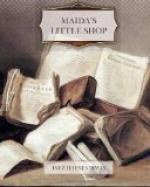“There’s that choild in the water again,” Granny would cry from the living-room.
Looking out, Maida would see Tim spread out on all fours. Like an obstinate little pig, he would lie still until Molly picked him up. She would take him home and in a few moments he would reappear in fresh, clean clothes again.
“Hello, Tim,” Billy Potter would say whenever they met. “Fallen into a pud-muddle lately?”
The word pud-muddle always sent Tim off into peals of laughter. It was the only thing Maida had discovered that could make him laugh, for he was as serious as Molly was merry. Molly certainly was the jolliest little girl in the court—Maida had never seen her with anything but a smiling face.
Dicky’s mother went to work so early and came back so late that Maida had never seen her. But Dicky soon became an intimate. Maida had begun the reading lessons and Dicky was so eager to get on that they were progressing famously.
The Lathrops lived in the big house at the back of the court. Granny learned from the Misses Allison that, formerly, the whole neighborhood had belonged to the Lathrop family. But they had sold all their land, piece by piece, except the one big lot on which the house stood. Perhaps it was because they had once been so important that Mrs. Lathrop seemed to feel herself a little better than the rest of the people in Primrose Court. At any rate, although she spoke with all, the Misses Allison were the only ones on whom she condescended to call. Maida caught a glimpse of her occasionally on the piazza—a tall, thin woman, white-haired and sharp-featured, who always wore a worsted shawl.
The house was a big, bulky building, a mass of piazzas and bay-windows, with a hexagonal cupola on the top. It was painted white with green blinds and trimmed with a great deal of wooden lace. The wide lawn was well-kept and plots of flowers, here and there, gave it a gay air.
Laura had a brother named Harold, who was short and fat. Harold seemed to do nothing all day long but ride a wheel at a tearing pace over the asphalt paths, and regularly, for two hours every morning, to draw a shrieking bow across a tortured violin.
The more Maida watched Laura the less she liked her. She could see that what Rosie said was perfectly true—Laura put on airs. Every afternoon Laura played on the lawn. Her appearance was the signal for all the small fry of the neighborhood to gather about the gate. First would come the Doyles, then Betsy, then, one by one, the strange children who wandered into the court, until there would be a row of wistful little faces stuck between the bars of the fence. They would follow every move that Laura made as she played with the toys spread in profusion upon the grass.




